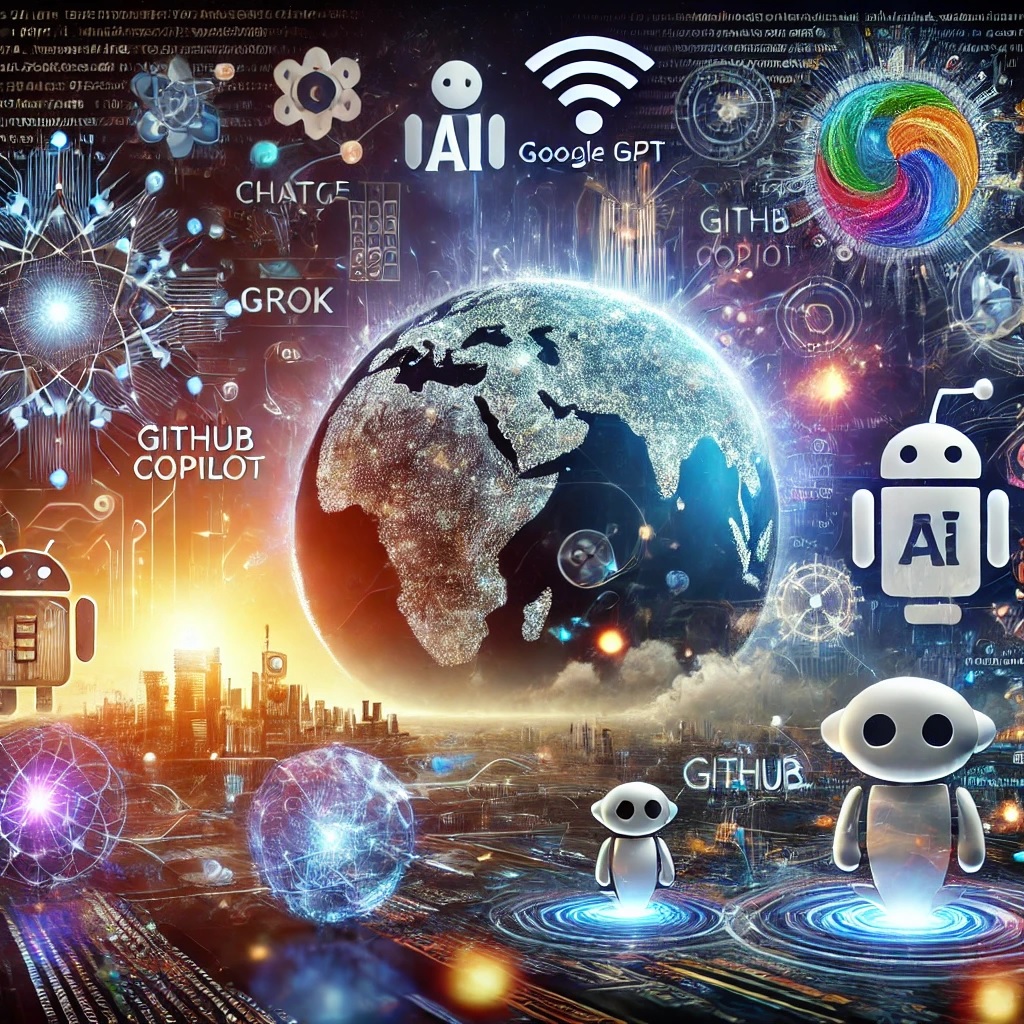Artificial Intelligence (AI) is no longer just a futuristic concept—it has become a critical part of modern life. From answering questions to aiding in creative tasks, AI language models are shaping industries across the globe. But as these technologies evolve, a fierce competition has emerged: a battle for supremacy, as companies and nations fight to control the development and deployment of AI.
Key Players in the AI Race
Several leading AI models are competing for dominance. These models differ in purpose, capabilities, and application, making them central to the ongoing “AI wars.”
ChatGPT by OpenAI

What it does: ChatGPT excels in natural language processing. It can answer questions, generate content, assist with coding, and even offer creative writing support.
Key Use: Popular among businesses, students, and developers for everyday use and writing assistance.
Google Bard
What it does: Bard leverages Google’s vast search data to generate natural language responses, providing real-time answers and summaries.
Key Use: Integrated with Google Search, making it ideal for handling real-time queries and information retrieval.
Grok by xAI

What it does: Created by Elon Musk’s xAI, Grok is tailored for integration with social media platforms, particularly X (formerly Twitter). It provides personalized responses and insights for social media users.
Key Use: Primarily used on X to engage with users through more targeted, context-driven AI interactions.
GitHub Copilot (by OpenAI & GitHub)
What it does: GitHub Copilot assists developers by suggesting code and functions based on context. It uses AI to help programmers write code faster and more efficiently.
Key Use: Popular among developers for enhancing productivity and accelerating software development.
DeepMind by Alphabet Inc.

What it does: DeepMind specializes in AI research, focusing on complex problems like protein folding and optimizing energy consumption.
Key Use: Primarily used for scientific research and advancing understanding in fields like healthcare and energy.
Specialized AI Models
What they do: These models focus on specific industries, such as healthcare (medical diagnosis), law (legal research), and climate science (environmental forecasting).
Key Use: Targeted at niche markets, offering solutions that are deeply tailored to specific business needs.
DeepSeek by DeepSeek

What it does: DeepSeek is an advanced AI platform designed for comprehensive data analysis and decision-making support,developed by China. It specializes in extracting insights from complex datasets, providing predictive analytics, and offering actionable recommendations. DeepSeek can assist in various domains such as finance, healthcare, marketing, and logistics by identifying patterns, trends, and anomalies in data.
The Politics Behind AI Wars
The development of AI is not just a race for technological supremacy—it’s also a battle for political and economic control.
Government Regulation
As AI’s role grows in society, governments are increasingly focused on regulating its development. The European Union is working on laws to regulate AI, balancing innovation with ethical concerns, privacy, and job displacement fears.
Corporate Control
Major tech companies like Microsoft, Google, and Meta are pouring billions into AI research and development. They seek not only technological innovation but also market dominance, which raises concerns about monopolistic practices and control over AI tools.
Geopolitical Rivalry
The United States and China are in an intense race for AI supremacy. Both countries are focusing on developing powerful AI technologies, while controlling access to data and establishing national standards. China’s tight censorship and regulation of AI reflect the strategic importance of these technologies.
AI Market Potential: Global Impact
AI is transforming various industries, with each sector driving unique applications and innovations. According to Statista, the global AI market is projected to reach USD 1.81 trillion by 2030, growing at a compound annual growth rate (CAGR) of 38.1%.
Here’s how AI is making an impact across key sectors:
Healthcare: AI applications in healthcare, from diagnostics to personalized medicine, are expected to reach USD 34 billion by 2025.
Finance: AI in finance, including fraud detection and personalized banking, is expected to grow to USD 28 billion by 2026, with a 23% CAGR.
Retail: The AI market in retail is expected to hit USD 23 billion by 2027, driven by personalized shopping experiences and predictive analytics.
Automotive: AI-driven innovations like autonomous vehicles and smart manufacturing will push the automotive AI market to USD 14.5 billion by 2030.
Manufacturing & Supply Chain: AI for optimizing production and supply chains is expected to reach USD 18 billion by 2026.
Countries’ Stance on AI and Bans
As AI becomes central to business and geopolitics, countries are taking different approaches to regulate or block AI models.
ChatGPT
Banned Countries: China, Russia, and Iran have restricted access to ChatGPT due to concerns over censorship, data privacy, and Western influence.
Restricted in: European Union countries like Italy temporarily banned ChatGPT in 2023 over privacy concerns (GDPR).
Google Bard
Banned Countries: China and Russia restrict Google Bard, citing concerns over information control and censorship.
Restricted in: EU countries also scrutinize Bard for potential violations of data protection laws (GDPR).
GitHub Copilot
Banned Countries: There are no formal bans, but intellectual property concerns have raised flags in some jurisdictions, particularly in the EU.
DeepMind
Banned Countries: No formal bans, as DeepMind primarily focuses on research and high-level collaborations with enterprises and institutions.
Could India Develop Its Own AI Models?
India has the potential to emerge as a major player in the global AI landscape, although there are challenges:
Government Initiatives
India has launched National Strategy on Artificial Intelligence and other initiatives like Digital India to promote AI research and innovation, focusing on sectors such as healthcare, agriculture, and governance.
However, India faces challenges like limited access to high-quality data, computational resources, and AI infrastructure compared to established global players.
Private Sector Investment
Tata Consultancy Services (TCS), Infosys, and Wipro are investing in AI R&D. Additionally, startups in India are exploring ways to develop AI solutions tailored to local needs.
Possibility of National AI Models
India could develop AI models based on local languages, cultural nuances, and regional needs. Collaborations with global tech firms or adaptation of open-source models could jumpstart these efforts.
Guarding Operational Secrets in AI Development
As AI grows in importance, safeguarding operational secrets becomes critical:
Data Privacy:
Companies rely on data encryption and anonymization techniques to secure sensitive data used in training AI models.
Intellectual Property:
AI companies protect their models and algorithms with patents and trade secrets to prevent misuse and ensure competitive advantage.
Government Regulations:
Laws like the GDPR in the EU enforce strict data protection standards to ensure transparency in AI processes and protect users’ privacy.
Model Safety:
Companies implement adversarial security measures to protect AI models from manipulation by external actors, ensuring the accuracy and reliability of their AI systems.
AI in Sri Lanka: Current Landscape and Opportunities

Sri Lanka’s engagement with AI is still in the early stages, but the potential is immense. Here’s how AI is being used and what challenges lie ahead:
AI Adoption: AI is being explored in sectors like education, healthcare, and business analytics. For instance, AI models are used to assist in diagnosing diseases, improving educational outcomes, and optimizing supply chain logistics.
Government Initiatives: The Sri Lankan government has started exploring AI’s role in governance and smart city initiatives, focusing on improving efficiency and service delivery.
Challenges: While Sri Lanka is making strides, challenges like infrastructure, data access, and skill gaps need to be addressed for AI to reach its full potential.
Statistics: According to the Sri Lanka Information and Communication Technology Agency (ICTA), the country has identified AI as a key area for technological development. However, AI adoption remains limited compared to other regions due to technological and resource constraints.







